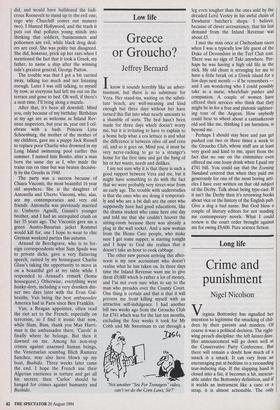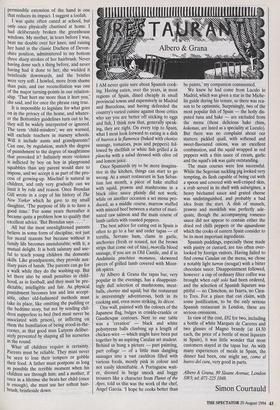Long life
Crime and punishment
Nigel Nicolson
permissible extension of the hand is one that reduces its impact. I suggest a loofah.
I was quite often caned at school, but only once physically chastised at home. I had deliberately broken the greenhouse windows. My mother, in tears before I was, bent me double over her knee, and raising her hand in the classic Duchess of Devon- shire position, administered to my bottom three sharp strokes of her hairbrush. Never having done such a thing before, and never having had it done to her, she wielded it bristleside downwards, and the bristles were very soft. I howled, more from shame than pain, and our reconciliation was one of the major turning-points in our relation- ship. 'That hurt me more than it hurt you,' she said, and for once the phrase rang true.
It is impossible to legislate for what goes on in the privacy of the home, and whatev- er the Bottomley guidelines turn out to be, they will be widely interpreted or ignored. The term 'child-minders', we are warned, will exclude teachers in nursery schools. Will it include aunts and grandparents? Can one, by regulation, match the degree of punishment to the degree of naughtiness that provoked it? Infinitely more violence is inflicted by boy on boy in playground squabbles than any parent would dare to Impose, and we accept it as part of the pro- cess of growing-up. Mischief is natural in children, and only very gradually can we limit it by rule and reason. Once Brendan Gill wrote in a copy of his history of The New Yorker which he gave to my small daughter, 'The purpose of life is to have a good time.' For some years thereafter it became quite a problem how to qualify that excellent advice. 'But Brendan says .... '
All but the most unenlightened parents believe in some form of discipline, not just for moral reasons but because without it family life becomes unendurable; with it, a mutual delight. It is both salutary and use- ful to teach young children the domestic skills. Like grandparents, they provide aux- iliary pairs of hands. The parents can go for a walk while they do the washing-up. But let there also be small penalties in child- hood, as in football, and they must be pre- dictable, intelligible and fair. As physical punishment becomes less and less accept- able, other old-fashioned methods must take its place, like omitting the pudding or the bedtime story, but not by sending chil- dren supperless to bed (bed must never be associated with prison), or inflicting on them the humiliation of being stood-in-the- corner, as that good man Lutyens deliber- ately prevented by shaping all his nurseries in the round.
What all children require is certainty. Parents must be reliable. They must never be seen to lose their tempers or gobble their food. A father must postpone as long as possible the terrible moment when his children see through him; and a mother, if once in a lifetime she beats her child (once Is enough), she must use her softest hair- brush, bristleside down.



















































 Previous page
Previous page